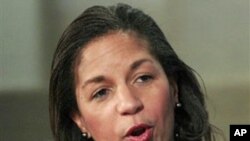European nations on the U.N. Security Council moved to turn up pressure on the government of Syrian President Bashar al-Assad Monday, circulating a revised draft resolution condemning his government’s bloody crackdown on pro-democracy protesters.
The Security Council has been deeply divided on how to respond to the violence in Syria since it began four and a half months ago.
The European members of the council - Britain, France, Germany and Portugal - brought a draft resolution before the council in April, but it faced strong opposition from veto-wielding members Russia and China, as well as Brazil, India and South Africa. It never made it to a vote.
Lebanon, which also sits on the council, is in the awkward position of having a pro-Syrian government in power and would be unlikely to vote for any resolution condemning the crackdown.
But in light of intensified and deadly government offensives on several cities during the last two days preceding the start of the Muslim holy month of Ramadan, the European council members hoped that those who had opposed a strong U.N. response would now support it.
U.S. Ambassador Susan Rice said the Obama administration has supported European efforts in the council during the past three months to get a resolution adopted.
“Given recent developments, we think it is very important that the council be clear and forceful in condemning what has transpired and the violence against the Syrian people," said Rice.
The United States has repeatedly condemned the violence in Syria and administration officials say Washington could impose further unilateral sanctions on the Assad government, this time targeting Syria's important oil and gas sector. On Monday, the European Union expanded its sanctions against Syria, imposing asset freezes and travel bans against five more military and government officials.
A European diplomat said the Security Council must act in the strongest way, meaning through a resolution. The diplomat added that the council’s silence has encouraged the Assad government continue its repression. He also expressed concerns that that could have implications for regional stability.
Indian Ambassador Hardeep Singh Puri, who took over the rotating presidency of the 15-member council on Monday, said members received a briefing from the U.N.’s deputy political chief on the situation in Syria and then held their own discussions, which he characterized as “encouraging.” He added that he detected a “certain convergence of thinking" and "concern about the escalating violence.” The Indian ambassador said the council would meet again on Tuesday morning, after members had received instructions from their capitals, to discuss the proposed European text.
Russia, which has been one of the council members opposed to a resolution, still appeared to be hesitant about what form any action should take. Ambassador Vitaly Churkin called a resolution “somewhat excessive” and said Moscow would consider a presidential statement from the council “satisfactory.”
Churkin told reporters that he and other council members are still concerned about opening the door to possible military action, similar to the situation in Libya.
“We are very strongly against, and have taken a very strong and clear position - and thankfully supported by a number of members of the Security Council - that to go down the Libyan road would have a dramatic and catastrophic consequences for Syria and for the region," said Churkin.
But U.S. Ambassador Rice said that council members who say they are shying away from action on Syria because of events in Libya are making excuses.
“That is a canard," she said. "Frankly, in my opinion it, has been an excuse by those that don't want to confront what is happening in Syria. There has never been in any of the drafts that the Europeans have circulated anything that should remind anybody of Libya for good or ill.”
Although some Security Council members have appeared to soften their rhetoric on a response in light of recent events, other diplomats say what they are hearing in public is not what they are hearing behind closed doors.
UN Security Council Again Considers Syria Resolution




